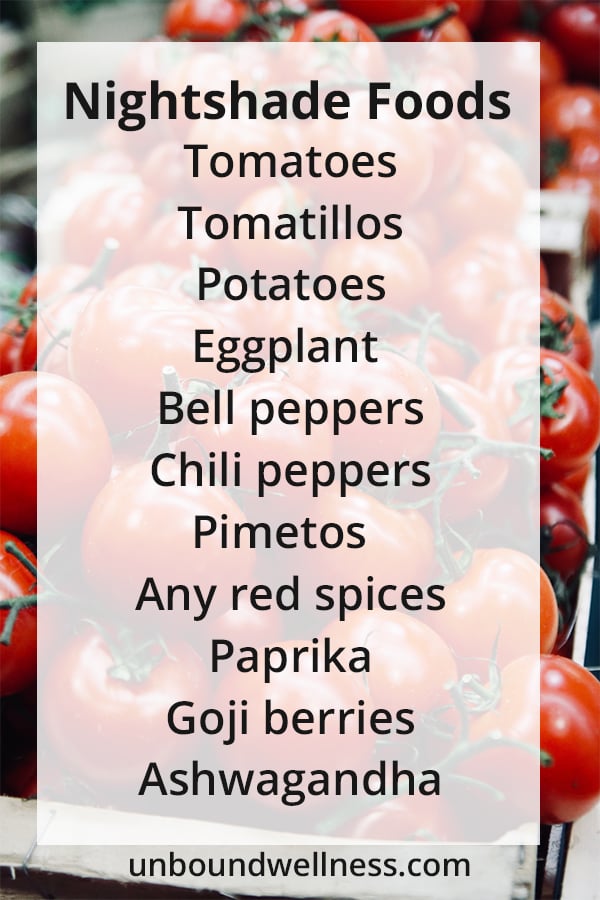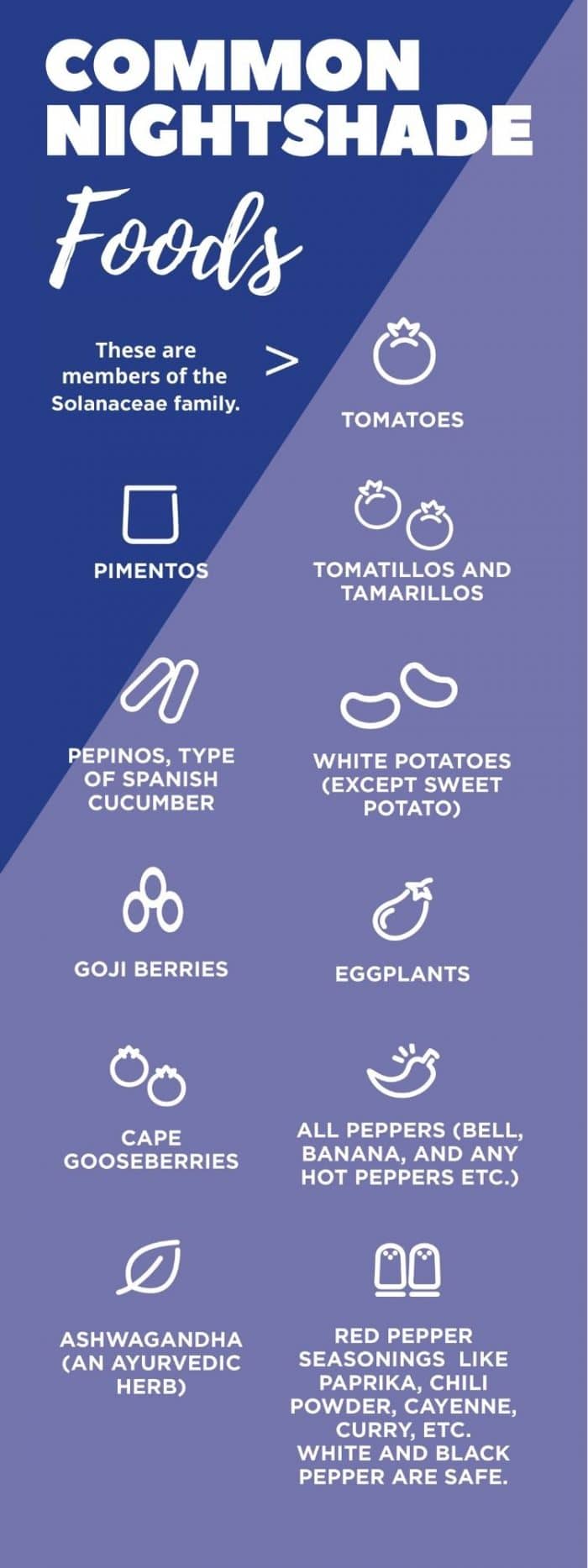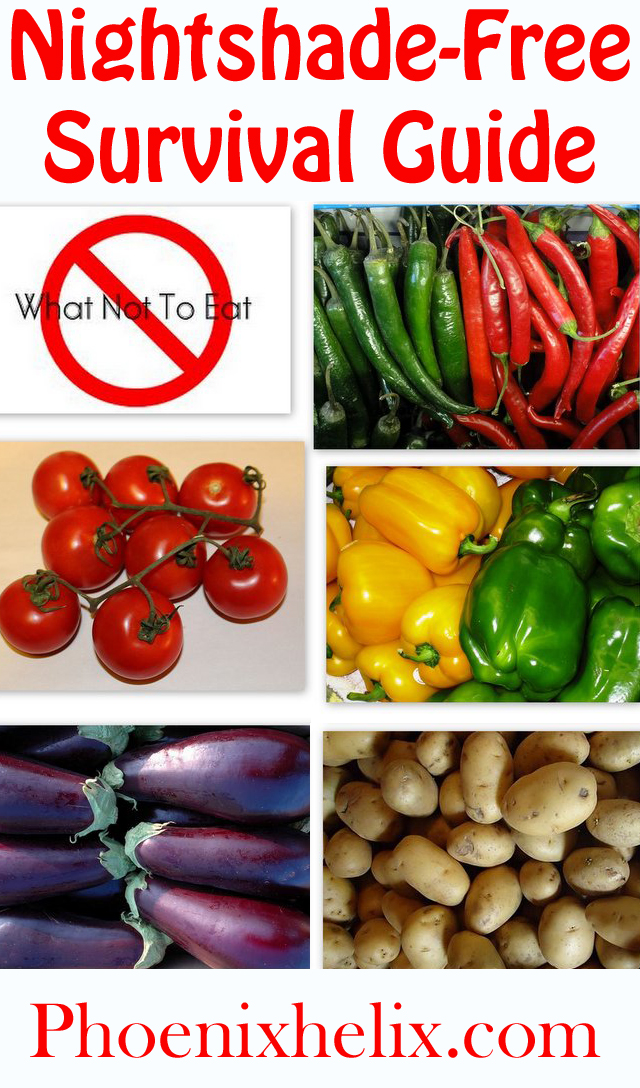Nightshades. You may have heard the term thrown around in health and wellness circles, but do you really know what they are and if you should be avoiding them? First things first, let’s define what nightshades are. Nightshades are a family of plants that belong to the Solanaceae family, and are characterized by their distinctive bell-shaped flowers. Some of the most common nightshade vegetables include tomatoes, potatoes, peppers, and eggplants. While these vegetables may be staples in many diets, there is some controversy surrounding their consumption. Some believe that nightshades can be harmful to certain individuals, as they contain compounds known as alkaloids. Alkaloids are naturally occurring compounds that can have both positive and negative effects on the body. In small amounts, they may offer health benefits, such as fighting inflammation and protecting against certain diseases. However, in larger amounts they can be toxic, causing symptoms such as nausea, vomiting, and diarrhea. So, should you be avoiding nightshades? The answer is, it depends. For most individuals, nightshades are perfectly safe to consume in moderate amounts. In fact, many of these vegetables are packed with essential vitamins and nutrients that our bodies need. For example, tomatoes are a great source of vitamin C and potassium, while peppers are high in vitamins A and C. However, there are some individuals who may be more sensitive to nightshades than others. Those with autoimmune conditions, such as rheumatoid arthritis or lupus, may find that consuming nightshades exacerbates their symptoms. This may be due to the fact that the alkaloids in nightshades can be irritating to the gut lining, leading to inflammation. If you suspect that you may be sensitive to nightshades, it’s worth experimenting with an elimination diet. This involves cutting out all nightshade vegetables for a period of time, usually around 2-4 weeks, and then slowly reintroducing them one at a time. This can help you pinpoint which foods are causing your symptoms, and determine whether or not you need to avoid them in the future. If you do decide to eliminate nightshades from your diet, it’s important to ensure that you’re still getting all the essential vitamins and nutrients that you need. There are plenty of alternative vegetables that you can consume that offer similar nutritional benefits. For example, if you’re used to eating potatoes, try sweet potatoes instead. If you love tomatoes, try swapping them out for red bell peppers. To help you get started with your nightshade-free journey, we’ve compiled a list of common nightshade vegetables that you may want to avoid, as well as some tasty alternatives that you can try.
Tomatoes
 Tomatoes are one of the most commonly consumed nightshade vegetables, and are a staple in many diets. They’re packed with antioxidants and vitamins, making them a great choice for those looking to improve their overall health. However, for some individuals, consuming tomatoes can exacerbate symptoms of inflammation and autoimmune conditions.
Tomatoes are one of the most commonly consumed nightshade vegetables, and are a staple in many diets. They’re packed with antioxidants and vitamins, making them a great choice for those looking to improve their overall health. However, for some individuals, consuming tomatoes can exacerbate symptoms of inflammation and autoimmune conditions.
If you’re looking for a tasty alternative to tomatoes, try red bell peppers. They’re similar in flavor and texture, but don’t contain the same alkaloids that can be irritating to some individuals. Peppers
 Peppers, including bell peppers, jalapenos, and chili peppers, are also part of the nightshade family. They’re a great source of vitamins A and C, and can add a flavor kick to any dish. However, like tomatoes, some individuals may find that they exacerbate symptoms of inflammation or autoimmune conditions.
Peppers, including bell peppers, jalapenos, and chili peppers, are also part of the nightshade family. They’re a great source of vitamins A and C, and can add a flavor kick to any dish. However, like tomatoes, some individuals may find that they exacerbate symptoms of inflammation or autoimmune conditions.
If you’re looking for an alternative to peppers, try using herbs and spices to add flavor to your dishes. Fresh basil, oregano, and thyme can all add depth to your meals without any of the potential negative effects of nightshades. Eggplants
 Eggplants are another common nightshade vegetable, and are a staple in many vegetarian and vegan diets. They’re high in fiber and low in calories, making them a great choice for those looking to lose weight or improve their digestion. However, like other nightshades, eggplants can be irritating to some individuals.
Eggplants are another common nightshade vegetable, and are a staple in many vegetarian and vegan diets. They’re high in fiber and low in calories, making them a great choice for those looking to lose weight or improve their digestion. However, like other nightshades, eggplants can be irritating to some individuals.
If you’re looking for an alternative to eggplant, try using zucchini or yellow squash instead. Both of these vegetables are low in calories and high in fiber, and can be used in a variety of dishes, from stir-frys to soups. Potatoes
 Potatoes are a staple in many diets, and are versatile enough to be used in a wide variety of dishes. They’re a great source of potassium and vitamin C, and can provide a filling carbohydrate boost to your meals. However, like other nightshade vegetables, potatoes contain alkaloids that can be irritating to some individuals.
Potatoes are a staple in many diets, and are versatile enough to be used in a wide variety of dishes. They’re a great source of potassium and vitamin C, and can provide a filling carbohydrate boost to your meals. However, like other nightshade vegetables, potatoes contain alkaloids that can be irritating to some individuals.
If you’re looking for an alternative to potatoes, try using sweet potatoes or butternut squash. Both of these vegetables are packed with essential vitamins and nutrients, and can be used in a variety of dishes, from roasted vegetable medleys to sweet potato fries. Tomatillos
 Tomatillos are a lesser-known nightshade vegetable that are commonly used in Latin American cuisine. They’re high in vitamin C and potassium, and have a unique tart flavor that can add depth to sauces and stews. However, as a nightshade vegetable, they may be problematic for some individuals.
Tomatillos are a lesser-known nightshade vegetable that are commonly used in Latin American cuisine. They’re high in vitamin C and potassium, and have a unique tart flavor that can add depth to sauces and stews. However, as a nightshade vegetable, they may be problematic for some individuals.
If you’re looking for an alternative to tomatillos, try using cucumbers or jicama instead. Both of these vegetables are crunchy and refreshing, and can be used raw in salads or as a low-carb chip alternative. Paprika
 Paprika is a spice that’s commonly used in a variety of dishes, from scrambled eggs to roasted meats. It’s made from ground dried peppers, and can add a smoky and slightly sweet flavor to your meals. However, as a nightshade spice, it may be problematic for some individuals.
Paprika is a spice that’s commonly used in a variety of dishes, from scrambled eggs to roasted meats. It’s made from ground dried peppers, and can add a smoky and slightly sweet flavor to your meals. However, as a nightshade spice, it may be problematic for some individuals.
If you’re looking for an alternative to paprika, try using smoked salt or garlic powder instead. Both of these spices can add a similar smoky flavor to your dishes without any of the potential negative effects of nightshades. Now that you know more about nightshade vegetables and their potential health benefits and risks, it’s up to you to decide whether or not you want to include them in your diet. If you do choose to avoid them, remember that there are plenty of alternative vegetables and spices that you can use to add flavor and nutrition to your meals. And if you suspect that you may be sensitive to nightshades, be sure to consult with a healthcare professional to determine the best course of action for your individual needs.